SEND Improvement Update – October 2022
SEND Improvement update – download
As we continue to make changes to deliver improvement to SEND services in Birmingham here is our update on progress since the last update in June 2022.
In order to keep you up to date with those we are producing regular quarterly updates on progress made to improve our services for children and young people with SEND.
We look forward to welcoming Helen Ellis, our permanent Director of SEND and Inclusion, who will join us on 2nd November. This is positive news and the beginning of our move to a new permanent SENAR structure over the next few months.
The improvements in SEND are part of a wider programme of work, ‘Birmingham Children Thrive’ in the Children and Families Directorate putting Children and Young People at the heart of Birmingham and focusing on:
- Identifying and supporting early aiming to get it right first time
- Professionals and services that wrap around our children and families
- Strengths based and relationship based practice with our children, families, each other and our partners
You can find out more about the Accelerated Progress Plan and SEND Improvement on the SEND Local Offer website here: www.localofferbirmingham.co.uk/ofsted2021/
The following outlines the progress that has and is being made by the SEND partnership on the areas of weakness identified by inspectors.
- We have been working with Parents and the Parent Carer Forum to provide parent/carers with the improved communication. In addition, the Special Educational Needs and Disabilities (SEND) Communications and Engagement Strategy has now been published and will be implemented across the SEND partnership.
www.localofferbirmingham.co.uk/wp-content/uploads/2022/08/SEND-Comms-and-Engagement-Strategy.pdf
- The SEND Local Offer website is undergoing transformation focusing on better navigation, improved content and a searchable directory. The improved site will be launched later this term – localofferbirmingham.co.uk
- We have undertaken a Parent Satisfaction survey to provide a baseline against which we can measure future Parental satisfaction and will undertake a follow-on parental satisfaction survey in Spring 2022 – the results of the first survey can be seen on the SEND Local Offer website here – localofferbirmingham.co.uk/ofsted2021/co-production.
- We have produced a Developing Local Provision newsletter which you can read here – localofferbirmingham.co.uk/latest-news/
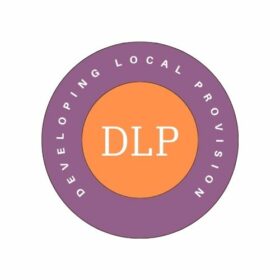 Developing Local Provision is a two-year project which aims to develop and improve provision, progress and outcomes for children and young people with additional needs or Special Educational Needs and Disabilities (SEND) in mainstream schools across Birmingham. The project is producing encouraging results.
Developing Local Provision is a two-year project which aims to develop and improve provision, progress and outcomes for children and young people with additional needs or Special Educational Needs and Disabilities (SEND) in mainstream schools across Birmingham. The project is producing encouraging results.
- The Co-Production Framework and Charter are now published on the SEND Local Offer website – localofferbirmingham.co.uk/ofsted2021/co-production/. You can see a short leaflet about Co-Production in Birmingham here: https://bit.ly/3Vlmyfy

- We are using the information that was shared by parents through case studies, complaints and findings from the quality reviews to influence the development of the Standard Operating Practices (documented shared way of working) and the Parent Education Health Care Plan (EHCP) Booklet. This will help us to improve communication, evidence improvements and improve the quality of the process. These documents will be available on the SEND Local Offer website within the coming weeks. They are being co-produced involving a variety of stakeholders.
- We are implementing a Quality Assurance framework, to improve the quality of the process and the quality of the Education Health and Care Plans. We will use the findings from the Quality audits to prioritise improvements and training for staff.
Quality Assurance (QA) systems are involved in defining, assuring, maintaining and improving quality. Part of the SEND Code of Practice, QA processes are central to ensuring that children, young people, young adults and their families receive the right services at the right time and that those services have a positive and lasting impact.
This Framework supports continuous improvement in the delivery of services to children with SEND and their families through clear definitions of the standards expected, ongoing self-assessment and evaluation. You can read it here.
- We are introducing INVISION which is a digital Education Health and Care plan audit tool that will support the SEND Service to improve the quality of the plans. It is a guided online system that allows staff to evaluate, record, analyse and benchmark the quality of our EHCPs nationally and across the local area. Testing of the system began in the summer and work will continue to roll this out globally.
- Work continues to implement NEXUS (the new digital system which will be used to manage the data to support the EHCP and annual review process) and will be available to SENAR in December and Parents/Carers in January. The system allows professionals and parents/carers to have a complete overview of cases and where they are in the system.
- The first multi-agency moderation meeting has been held which reviews the quality of EHC plans and processes working on continual improvement.
- We are developing our links with Regional Partners, which will allow us to share learning and best practice. There are opportunities to share training modules and work together to address common issues.
- We are continuing to co-produce an Inclusion Strategy and an overall SEND strategy for Birmingham; these will be published in November.
- Number of complaints has reduced from 53 in November 2021 to 39 in July 2022 but this is still above the baseline of 33 Dec 2021. The average number of days taken to resolve a complaint has dropped from 37 in August 2021 to 11 in July 2022.
- There have been improvements to the 20-week statutory compliance with Education, Health and Care Needs Assessments – 66% of assessments were completed within 20 weeks in July 2022 compared to 62% Feb 2022 and 65% national average.
- The % Annual Reviews actioned within 4 weeks of the meeting was at 0.8% in September 2021 (2 out of 242); our latest performance for July 2022 was 33% (332 out of 996).
- Due to more appropriate casework now in place, there has been a reduction in NEETs (Not in Education Employment or Training) with EHCPs from 9% in May 2021 (945 young people) to 4% in July 2022 (425 young people)
- Feedback from School: “Could I take this opportunity to thank you for all your support since you started. You have contacted me in a timely fashion and always maintained communication. Reviews and EHC Plan requests have been co-ordinated really well and e-mails have been forwarded to others at SENAR* if needed. I’d especially like to thank you for working tirelessly around securing provision for G and A. Your work will ensure their lives will be enriched and they have more opportunities to reach their full potential.”
*Special Education Needs Assessment and Review
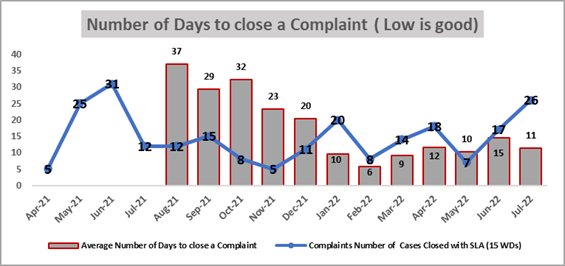
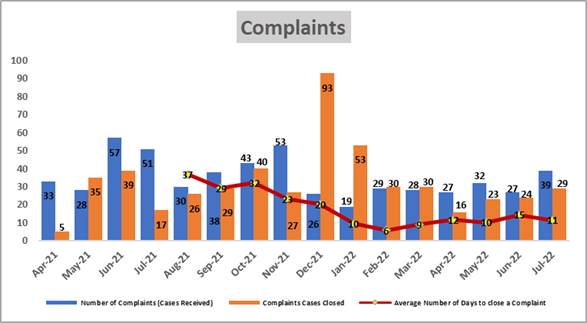


 Short Breaks
Short Breaks
We are writing to parents/carers whose children are currently in receipt of short breaks from the Trust to explain about the review process and contact that will be made directly with families over the next few months. The reviews will ensure equity and parity as well as looking at how well the short break is meeting the assessed needs of children.
Needs change over time which may mean children require less or more service provision. By holding regular review meetings, we can focus on children’s needs and their short break provision and how well this meets the need at the current time. Parents / carers can contact their allocated worker or family support duty officer if they have any queries once they have received their letter.
The new short breaks policy can be accessed here
Name Change in Birmingham Children’s Trust
The Trust’s Disabled Childrens’ social care service (DCSC) has changed its name to Children With Disabilities (CWD), to better reflect our focus on children.
Children’s Community Therapy and Neurodevelopment Services (BCHC) – Update
Birmingham Community Healthcare (BCHC) deliver support to families across Birmingham for Children’s Community Therapy and Neurodevelopment Services.
Children’s Community Therapy includes Speech and Language Therapy (SLT), Occupational Therapy (OT) and Physiotherapy.
Neurodevelopment Services incudes Autism Spectrum Disorder (ASD) and Attention Deficit Hyperactivity Disorder (ADHD). The Autism Diagnostic Observation Schedule (ADOS) is a tool used to diagnose ASD and this work is reported within the ASD pathway.
Children’s Community Therapy Services
What we are doing to improve waiting times
- All the children’s community therapy services are ensuring that children with the highest clinical need are prioritised. A process of prioritisation takes place at the point a referral is received into the service, at monthly service meetings and children’s reviews.
- We have specific systems to help us manage our waiting lists so we can see exactly how many children are waiting and what support they need.
- We are focusing on staff recruitment and retention to increase the number of children’s community therapists, this will support the reduction in waiting times.
- We have planned how we are going to progressively improve our waiting times over the next 6 months. The plan also helps to identify any gaps and changes to staffing levels that might be required.
- Our advice lines continue to be well used and provide information, advice and guidance to families and professionals for children who are waiting for an assessment or package of care. For OT and SLT, this advice extends to queries for children who have not yet been referred. Advice line details are listed on the service specific webpages, see links below.
- The Trust webpages give support and guidance directly from the community therapy services. The webpages contain a range of resources, flyers, and links to further support families while they wait for their child’s appointment. Please see the link: https://www.bhamcommunity.nhs.uk/patients-public/children-and-young-people/services-parent-portal/
Children’s Community Therapies Waiting Times Data
- The data below outlines the waiting list data for children’s community Speech and Language Therapy (SLT), Occupational Therapy (OT) and Physiotherapy. The data shows the number of children waiting for initial assessment (IA) and the average wait in weeks. Overall referral rates into all services have increased due to increased level of need identified in children and young people and through covid recovery work where children are being seen again.
What’s Happening in Speech and Language Therapy (SLT)
Speech and Language Therapy (SLT) waits in special schools have begun to reduce with the average wait coming down (for direct intervention work) to 48.4 weeks from 54.5 weeks reported in May 2022. Targeted to continue to reduce and monitor wait times for all SLT teams.
- Referrals remain high into the service due to an increasing level of need.
- The average wait time in weeks has begun to reduce.
- The majority of ‘first’ contacts with families take place within 18 weeks (within target).
- Specific planning is in place to further reduce waiting times, the plan includes moving staff within the SLT service departments to focus on cohorts of children with the longest waits (e.g., focus on the special school’s cohort).
For information and support on the Speech and Language Therapy service follow the link: https://www.bhamcommunity.nhs.uk/patients-public/children-and-young-people/services-parent-portal/birmingham-slt/
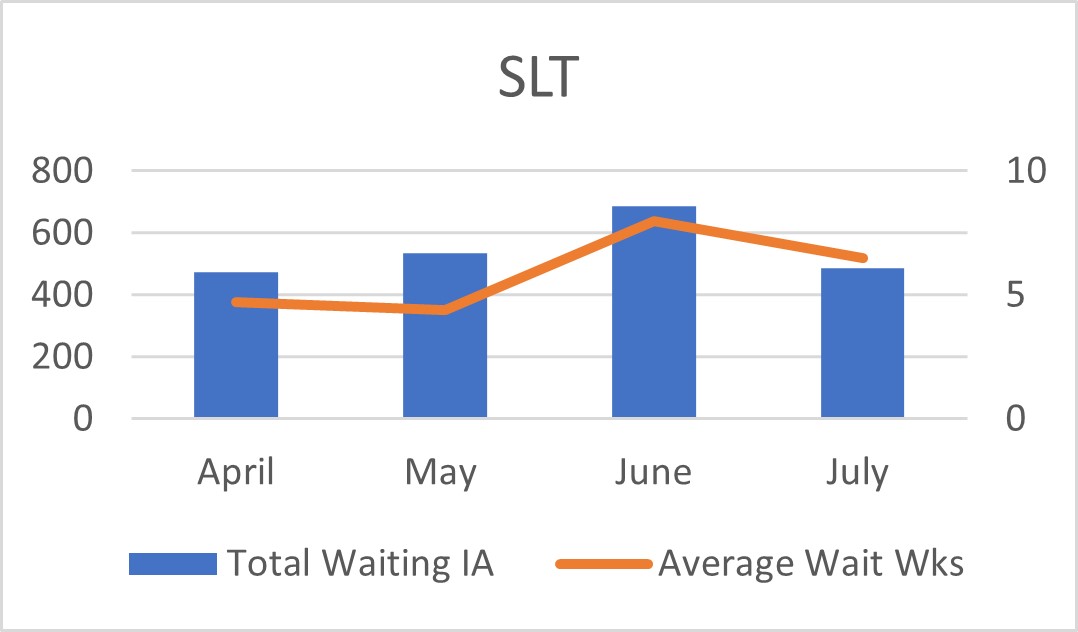
What’s Happening in Occupational Therapy (OT)
There have been some reductions in overall waits in Occupational Therapy (OT) – as a result children are seen more quickly (for assessment in particular and intervention) which is helping to prevent the risk of more complex problems developing if children wait. The total number of children on the Occupational Therapy caseload at the end of June 2022 is 805, down from 827 reported March 2022. The average wait time for initial assessment has reduced to 7 weeks from 9 weeks reported March 2022
- Referrals into the Occupational Therapy (OT) service have increased due to increased needs of children and young people.
- The OT service has worked hard to reduce the number of children waiting for initial assessment and the average wait time, which is holding at around 7 weeks.
- The OT service has received further investment into the locality therapy team to support staff recruitment. These therapists support schools and families, and the therapy team is having a positive effect on waiting times for those children who require specialist intervention.
- There are a lot of children waiting for individual OT input, this takes more of the therapist’s time therefore it can create a longer waiting time however, this support is important and gains positive outcomes for the child/young person.
- Specific OT parent workshops have been developed offering targeted support to families for a range of specific difficulties children may be experiencing. These are accessed via a referral.
The OT service has refreshed its webpages, with a new simplified format to guide users to the information available, follow the link https://www.bhamcommunity.nhs.uk/patients-public/children-and-young-people/services-parent-portal/paediatric-occupational-therapy-service/
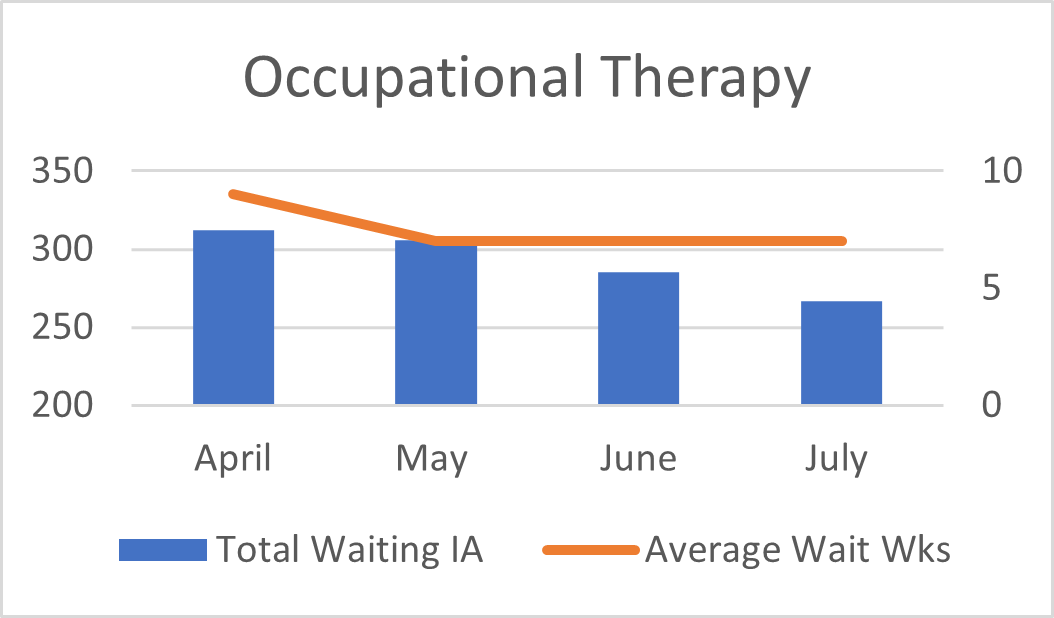
What’s Happening in Physiotherapy
- There has been a large increase in referrals to the Physiotherapy service from increasing need identified in children and young people.
- Community clinics are operating face to face across the city, most commonly for initial assessments or reviews. Virtual appointments continue to be available to provide flexibility and enhance the offer and choice for families.
- The number of children and young people waiting for the Physiotherapy support has decreased slightly over the last 3 months and the average waiting time has held at around 27 weeks. There remain some long waits, which are reviewed regularly. Waiting times for children with Musculo-skeletal problems have reduced, which has been supported through a Locum joining the team.
- Service improvement work is underway to review the approach to dealing with less urgent referrals, so families receive advice and support earlier, rather than waiting for a clinic appointment.
- PIFU system (Patient Initiated Follow-Up) at discharge in Physio gives families more control over their follow-up care, by allowing them to be the ones who initiate further follow-up appointments.
For information and support on the Physiotherapy service follow the link: https://www.bhamcommunity.nhs.uk/patients-public/children-and-young-people/services-parent-portal/paediatric-physiotherapy-service/
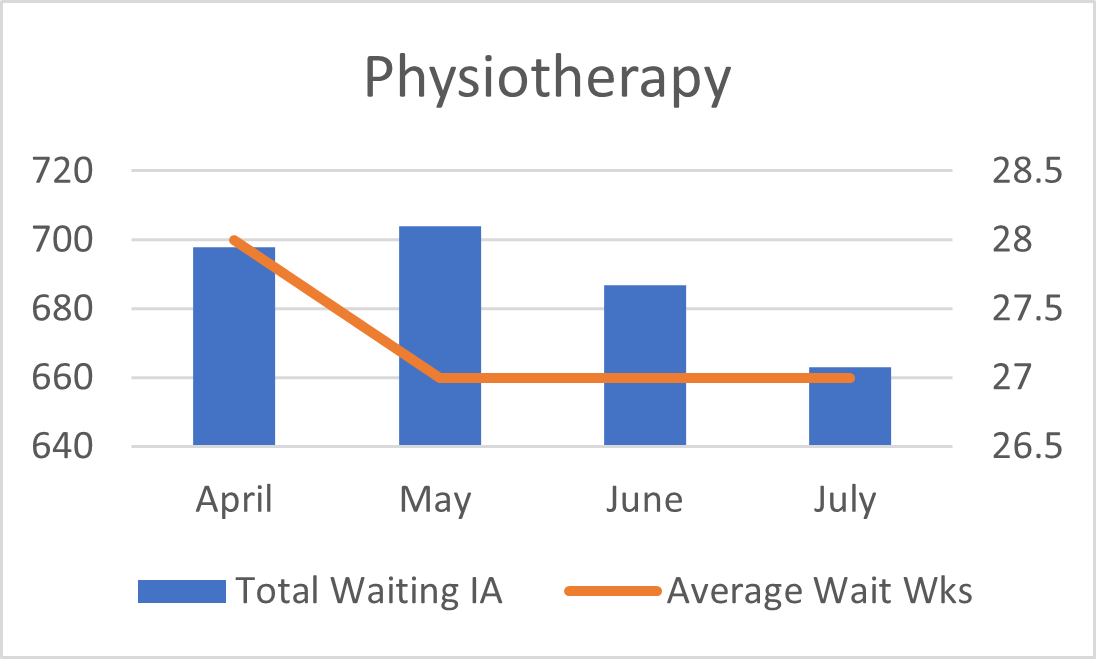
Children’s Neurodevelopment Pathway (NDP) Services
What’s Happening in Autism Spectrum Disorder (ASD) and Attention Deficit Hyperactivity Disorder (ADHD)
- Ongoing recruitment to the Neurodevelopment Pathway team? is taking place to ensure a good clinical mix, multi-disciplinary teams are in place to meet the needs of an integrated all age ASD pathway. Additional clinical capacity from nurses, therapists, clinical psychologists and doctors is still required to meet the current referral rates.
- There is increased interest from professionals to join the team following continued marketing of the service across social media, NHS jobs, conferences/exhibitions etc.
- Partnership arrangements with Healios (virtual ASD assessments 7+ years) and Clinical Partners (face to face Autism Diagnostic Observation Schedule -ADOS, clinics 5 years – 17 years) has helped to reduce waiting times. Healios and the NDP school age clinical team have seen over 1900 children (as of end of August 2022) since the start of the Healios contract can we give this some context against how many children are still waiting?. Clinical partners are a relatively new partnership and have seen 100 children to date and received referrals for 500 children /families over August and September 2022 who are being contacted and offered appointments. I think we need to explain who/what Clinical Partners are – I don’t think readers will necessarily know.
- Demand and capacity work and a review of the ADHD model continues, following an increase in referrals and an increase in diagnostic clinic appointments required. Is there a time frame for this – how will it improve the situation for parents/carers?
- Improved tracking of children and waiting times, allocation of appointments and identification of urgent issues through the use of the new tracker tools in NDP (Neurodevelopmental Pathway) and each of the therapy services.
Children’s Neurodevelopment Pathway Services Waiting Times Data
The graphs below show that the number of children waiting for all age ASD and ADOS services has reduced along with the average number of weeks children are waiting.
The number of referrals per week to the ADHD services has doubled compared to pre-pandemic, which has resulted in the number of school age children waiting for ADHD service increasing over recent months, however the average number of weeks children are waiting to be seen has remained the same.
For information and support on the NDP service follow the link: https://www.bhamcommunity.nhs.uk/patients-public/children-and-young-people/services-parent-portal/neurodevelopmental-pathway/

